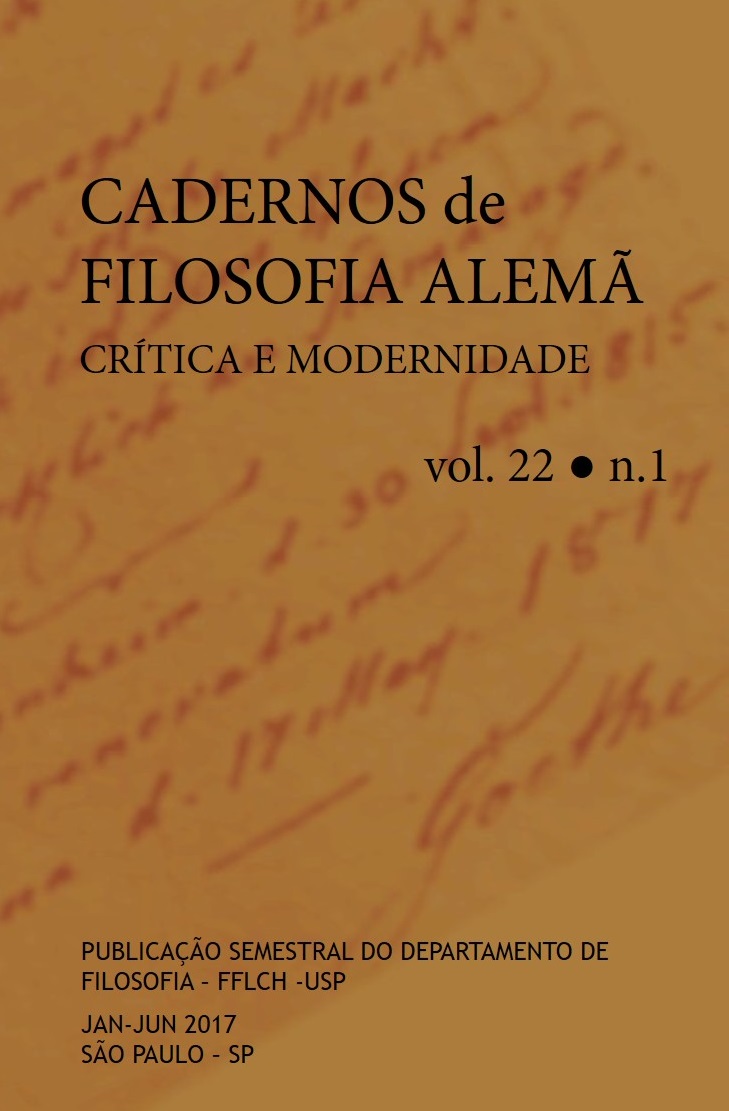Frankfurt School Critical Theory and the Persistence of Authoritarian Populism in the United States
DOI:
https://doi.org/10.11606/issn.2318-9800.v22i1p13-38Keywords:
Critical Theory, right-wing populism, authoritarianism, Frankfurt SchoolAbstract
The first part of the essay provides a brief overview of the Critical Theorists’ studies of authoritarianism and right-wing populism. The second part examines the emergence of the Tea Party and Donald Trump’s success in expanding and intensifying this right-wing populist movement by harnessing it to his own authoritarian leadership. Drawing on the conceptual resources outlined in the first section, I seek to demonstrate in the second section how the Critical Theorists’ analyses of right-wing populism and authoritarianism can still explain key aspects of the Tea Party and Trump. Throughout this essay Critical Theory and right-wing populism is situated within two levels of historical periodization: first, the modern bourgeois epoch as whole and, second, specific periods within that epoch. The aim of the latter periodization is to illuminate the specific historical and social conditions that have inhibited or favored the emergence of right-wing populist and authoritarian movements.Downloads
References
Abromeit, J. (2011). Max Horkheimer and the Foundations of the Frankfurt School. New York: Cambridge University Press.
_____________. (2013). Whiteness as a Form of Bourgeois Anthropology? Historical Materialism and Psychoanalysis in the Work of David Roediger, Max Horkheimer, Erich Fromm, and Herbert Marcuse. Radical Philosophy, 16(1), pp.325–343.
_____________. (2013a). Review of “Friedrich Pollock and Theodor W. Adorno, Group Experiment and Other Writings: The Frankfurt School on Public Opinion in Postwar Germany”. Journal of Modern History, 85(1), pp.161-168
_____________. (2016). “Transformations of Producerist Populism in Western Europe”. In: Transformations of Populism in Europe and the Americas: History and Recent Tendencies. J. Abromeit, B. Chesterton, Y. Norman and G. Marotta (eds.). London and New York: Bloomsbury.
Adorno, T.; Frenkel-Brunswik, E; Levinson, D. J.; Sanford, R. N. (1950). The Authoritarian Personality. New York: Harper & Brothers.
Adorno, T. (1969). “Scientific Experiences of a European Scholar in America”. In: D. Fleming and B. Bailyn (eds.). The Intellectual Migration: Europe and America, 1930–1960. Cambridge, MA: Harvard University Press.
_____________. (1977). “Über Tradition”. In: Rolf Tiedemann (ed.). Gesammelte Schriften, vol. 10.1. Frankfurt a.M.: Suhrkamp.
_____________. (1998). “The Meaning of Working through the Past”. In: Critical Models: Interventions and Catchwords. Edited and translated by Henry Pickford. New York: Columbia University Press.
_____________. (1998a). “Vorlesungen zur Ästhetik (1967)”. Wolfgang Kraushaar (ed.). Frankfurter Schule und Studentenbewegung, vol. 2. Hamburg: Zweitausandeins.
Benjamin, W. (1968). “Theses on the Philosophy of History”. In: Illuminations. Hannah Arendt (ed). Translated by Harry Zohn. New York: Schocken.
Formisano, R. (2012). The Tea Party: A Brief History. Baltimore: Johns Hopkins University Press.
Fritzsche, P. (1998). Germans into Nazis. Cambridge, MA: Harvard University Press.
Fromm, E. (1983). Arbeiter und Angestellte am Vorabend des Dritten Reiches: Eine sozialpsychologische Untersuchung. Wolfgang Bonss (ed.). Munich: Deutscher Taschenbuch Verlag, 1983.
Hobsbawm, E. (1994). The Age of Extremes: A History of the World, 1914-1991. New York: Vintage Books.
Horkheimer, M. (1949). “Introduction”. In: Lowenthal, L. and Guterman, N. Prophets of Deceit: A Study of the Techniques of the American Agitator. New York: Harper & Brothers.
_____________. (1993). “Egoism and Freedom Movements: On the Anthropology of the Bourgeois Epoch”. In: Between Philosophy and Social Science: Selected Early Writings. Translated by G.F. Hunter, M.S. Kramer and J. Torpey. Cambridge, MA: MIT Press.
Jay, M. (1982). Introduction to Horkheimer. Telos, 54, pp.5-9.
Lepore, J. (2010). The White of Their Eyes: The Tea Party’s Revolution and the Battle over American History. Princeton and Oxford: Princeton University Press.
Lowenthal, L. and Guterman, N. (1949). Prophets of Deceit: A Study of the Techniques of the American Agitator. New York: Harper & Brothers.
Mudde, C. (2016). “Populist Radical Right Parties in Europe Today”. In: Transformations of Populism in Europe and the Americas: History and Recent Tendencies. J. Abromeit, B. Chesterton, Y. Norman and G. Marotta (eds.). London and New York: Bloomsbury.
Piketty, T. (2014). Capital in the Twenty-First Century. Cambridge, MA: Harvard University Press.
Polanyi, K. (1944). The Great Transformation. New York: Rinehart.
Postone, M; and Brick, B. (1993). “Critical Theory and Political Economy”. In: S. Benhabib, W. Bonss and J. McCole (eds.). On Max Horkheimer: New Perspectives. Cambridge, MA: MIT Press.
Skocopl, T. & Williams, V. (2012). The Tea Party and the Remaking of American Conservatism. New York: Oxford University Press.
Taub, A. (2016). The rise of American Authoritarianism. Vox. http://www.vox.com/2016/3/1/11127424/trump-authoritarianism (acessado em: 16.02.2016).
Worrell, M. (2008). Dialectic of Solidarity: Labor, Antisemitism and the Frankfurt School. Chicago: Haymarket Books.
Ziege, E.-M. (2009). Antisemitismus und Gesellschaftstheorie: Die Frankfurter Schule im amerikanischen Exil. Frankfurt a.M.: Suhrkamp.
Downloads
Published
Issue
Section
License
Information and conceptions on the texts are complete responsibility of the authors.
All the articles submitted before July 5th 2018 and those published after July 2021 are licensed under a CC BY-NC-ND license – except those published between the aforementioned dates, which are under the CC BY-NC-SA license. The permission for the translation of the material published under the license CC BY-NC-ND by third parts can be obtained with the consent of the author.
Open access policies - Diadorim
Rules applied before July 5th 2018:
Presenting a submission to our Editorial Board implies granting priority of publication for “Cadernos de filosofia alemã”, as well as transferring the copyright of texts (once published), which will be reproduced only with the manifest authorization of the editors. Authors keep the right to reuse the texts published in future editions of their work, without paying any fees to "Cadernos”. We will not grant the permission to re-edit or translate the texts for third parts without agreement of the author.


